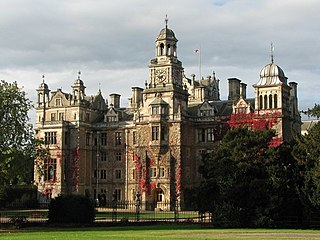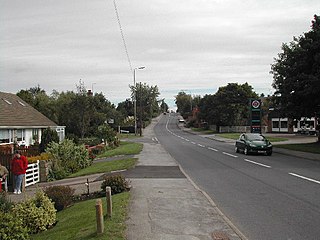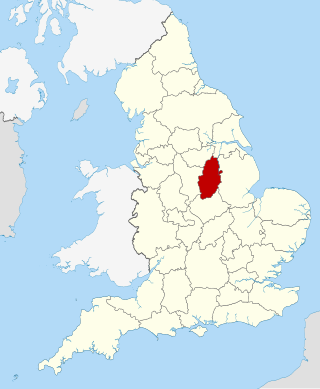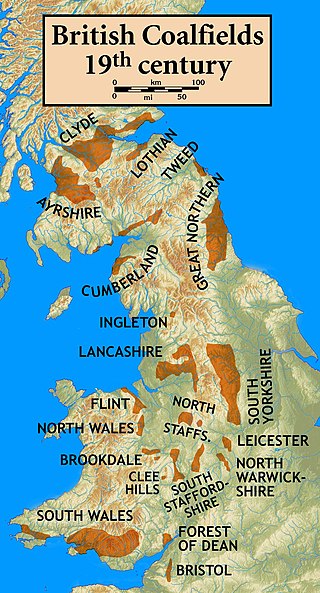Related Research Articles

Nottingham is a city and unitary authority area in Nottinghamshire, East Midlands, England. It is located 33 miles (53 km) south-east of Sheffield and 45 miles (72 km) north-east of Birmingham. Nottingham is the legendary home of Robin Hood and to the lace-making, bicycle and tobacco industries. The city is also the county town of Nottinghamshire and the settlement was granted its city charter in 1897, as part of Queen Victoria's Diamond Jubilee celebrations.

Nottinghamshire is a ceremonial county in the East Midlands of England. The county borders South Yorkshire to the north-west, Lincolnshire to the east, Leicestershire to the south, and Derbyshire to the west. The largest settlement is the city of Nottingham (323,632), which is also the county town.

The 1984–1985 United Kingdom miners' strike was a major industrial action within the British coal industry in an attempt to prevent closures of pits that the government deemed "uneconomic" in the coal industry, which had been nationalised in 1947. It was led by Arthur Scargill of the National Union of Mineworkers (NUM) against the National Coal Board (NCB), a government agency. Opposition to the strike was led by the Conservative government of Prime Minister Margaret Thatcher, who wanted to reduce the power of the trade unions.

Ollerton is a town and former civil parish, now in the parish of Ollerton and Boughton, in the Newark and Sherwood district, in the county of Nottinghamshire, England, on the edge of Sherwood Forest in the area known as the Dukeries. The population of Ollerton and Boughton at the 2011 census was 9,840.

Vernon Rodney Coaker, Baron Coaker is a British politician and life peer serving as Minister of State in the Ministry of Defence since 2024. A member of the Labour Party, he was Member of Parliament (MP) for Gedling from 1997 to 2019.

Gedling is a local government district with borough status in Nottinghamshire, England. The council is based in Arnold. The borough also includes Carlton along with villages and rural areas to the north-east of Nottingham. The main built-up part of the borough around Arnold and Carlton forms part of the Nottingham Urban Area.

Arnold is a market town in the Borough of Gedling in the county of Nottinghamshire in the East Midlands of England. It is situated to the north-east of Nottingham's city boundary. Arnold has the largest town centre in the Borough of Gedling and the most important town centre in the northeastern part of the conurbation of Greater Nottingham. Gedling Borough Council is headquartered in Arnold. Since 1968 Arnold has had a market, and the town used to have numerous factories associated with the hosiery industry. Nottinghamshire Police have been headquartered in Arnold since 1979. At the time of the 2011 United Kingdom census, Arnold had a population of 37,768.

George John Scipio Africanus was a West African former slave who became a successful entrepreneur in Nottingham, England.

Nottinghamshire is a county that is situated in the East Midlands of England. The county has history within the Palaeolithic period, dating anywhere between 500,000 and 10,000 BCE, as well as early Anglo-Saxon communities, dating to 600 CE. Furthermore, the county has significance in the political aspects of English history, particularly within intercommunal fighting, and its economics is historically centred around coal and textiles.

The Dukeries is an area of the county of Nottinghamshire so called because it contained four ducal seats. It is south of Worksop, which has been called its "gateway". The area was included within the ancient Sherwood Forest. The ducal seats were:

Colwick is a village and civil parish, in the Borough of Gedling of Nottinghamshire, England. It is situated to the east of Nottingham's city boundary, and forms the Colwick ward. At the time of the 2011 census, the village had a population of 2,829, falling to 2,778 at the 2021 census.

Bilsthorpe is a village and civil parish in the Newark and Sherwood district of Nottinghamshire, England. According to the 2001 census it had a population of 3,076, increasing to 3,375 at the 2011 census, and dropping slightly to 3,365 at the 2021 census. It is located near the junction of the A614 and A617, around 5 miles south of Ollerton, 9 miles east of Mansfield and 6 miles north-west of Southwell.

Nottinghamshire Police is the territorial police force responsible for policing the shire county of Nottinghamshire and the unitary authority of Nottingham in the East Midlands area of England. The area has a population of just over 1 million.

Gedling is a village and former civil parish which gives its name to the larger Borough of Gedling in Nottinghamshire, England. It lies 4 miles (6.4 km) north-east of Nottingham city centre. The parish was abolished in 1935 and absorbed into the urban district of Carlton, which in turn was abolished in 1974 on the creation of borough of Gedling. The population of the Gedling ward at the 2011 census was 6,817 and 111,787 for the district. Gedling was recorded in the Domesday Book and is still a distinct settlement, although residential, commercial and industrial growth in the wider borough of Gedling and the neighbouring city of Nottingham, boroughs of Broxtowe and Rushcliffe and district of Ashfield means it can be difficult to distinguish the village of Gedling from the nearby town of Carlton, with which it has become contiguous.

Gedling Miners Welfare Football Club is a semi-professional football club based in Mapperley, Nottingham, England. Founded in 1919 as the works team of Gedling Colliery, the club went into abeyance in 1935 due to a lack of support. It reformed in 1941 and soon began its most successful period, prompting the Daily Mirror to describe Gedling as "Nottinghamshire's leading amateur team" in 1956. The club's reputation had waned by the mid-1960s, and the team endured relative obscurity until it joined the nationwide league system in 2003. Gedling now competes in the United Counties League (UCL) Division One at the tenth tier of the English football pyramid.

Newstead is a village and civil parish in Nottinghamshire, England in the borough of Gedling. It is situated between the city of Nottingham and the towns of Kirkby-in-Ashfield, Sutton-in-Ashfield and Hucknall.
Marjorie Helen Arnfield, was an English artist who specialised in both industrial and rural landscapes, painting in oil, acrylic and watercolour. Her landscapes, particularly her paintings of Provence and Spain, are characterised by vivid colours and an impressionistic style. In an interview in the magazine Artists & Illustrators in 1998, Arnfield described her palette of colours, which included ochres, burnt siennas, cadmium, viridian, reds and blues, as "colours that sing".

Coal mining in the United Kingdom dates back to Roman times and occurred in many different parts of the country. Britain's coalfields are associated with Northumberland and Durham, North and South Wales, Yorkshire, the Scottish Central Belt, Lancashire, Cumbria, the East and West Midlands and Kent. After 1972, coal mining quickly collapsed and had practically disappeared by the 21st century. The consumption of coal—mostly for electricity—fell from 157 million tonnes in 1970 to just 587,000 tonnes in 2023. Employment in coal mines fell from a peak of 1,191,000 in 1920 to 695,000 in 1956, 247,000 in 1976, 44,000 in 1993, 2,000 in 2015, and to 360 in 2022.

Mansfield is a market town and the administrative centre of the Mansfield District in Nottinghamshire, England. It is the largest town in the wider Mansfield Urban Area and the second largest settlement in Nottinghamshire. It gained the Royal Charter of a market town in 1227. The town lies in the Maun Valley, 12 miles (19 km) north of Nottingham. It had a population of 110,500 at the 2021 census. Mansfield is the one local authority in Nottinghamshire with a publicly elected mayor, the Mayor of Mansfield.
References
- ↑ "Profile | Nottingham News Centre". nottinghamnewscentre.com. 13 October 2020. Retrieved 5 March 2024.
- ↑ Blake, Keimae (6 October 2021). "Nottingham born author works to 'diversify' British museums". Nottinghamshire Live. Retrieved 5 March 2024.
- 1 2 3 Motune, Vic (March 2024). "Unearthing untold stories". The Voice . p. 3.
- 1 2 Blake, Keimae (6 October 2021). "Meet the Nottingham born author and broadcaster working to 'diversify' British museums". NottinghamshireLive. Retrieved 5 March 2024.
- ↑ "Home – Black Miners Museum". blackcoalminers.com. Retrieved 5 March 2024.
- ↑ Pratley, C.; Gregory, N. (2022). Fuggle, S. (ed.). "Celebrating diverse heritage: Norma Gregory on 'Digging deep, Black miners' heritage'". S. Fuggle. YouTube.
- 1 2 3 Administrator (15 May 2020). "Literary Locations #58: Beaconsfield Street, Hyson Green". Nottingham City of Literature. Retrieved 5 March 2024.
- 1 2 "Ethnic Media Consultancy | Norma Jacqueline Gregory UK". 13 October 2020. Retrieved 5 March 2024.
- 1 2 "Nottingham News Centre | Diversity, Equality and Inclusion Consultancy". nottinghamnewscentre.com. 13 October 2020. Retrieved 5 March 2024.
- ↑ "Nottingham News Centre". Arts Fundraising and Philanthropy. 6 September 2021. Retrieved 5 March 2024.
- ↑ chrismoffat (22 June 2015). "Norma Gregory". Black British History. Retrieved 5 March 2024.
- ↑ TOCaribNews (4 November 2019). "Digging deeper with Norma Gregory". Toronto Caribbean Newspaper. Retrieved 5 March 2024.
- ↑ Mudd, Vanessa (30 December 2019). "EXHIBITION | Norma Gregory on Digging Deep to Celebrate Britain's Black Mineworkers". the CULTURE VULTURE. Retrieved 5 March 2024.
- ↑ "Home – Black Miners Museum". blackcoalminers.com. Retrieved 5 March 2024.
- ↑ Gregory, Norma (2015). Jamaicans in Nottingham: Narratives and Reflections. Hansib. ISBN 978-1910553015.
- ↑ Gregory, Norma (2023). An Introduction to Sharing and Celebrating Diverse Industrial Heritage. Nottingham News Centre Publications.
- 1 2 team, Code8. "Norma Gregory". Peters Fraser and Dunlop (PFD) Literary Agents. Retrieved 5 March 2024.
{{cite web}}: CS1 maint: numeric names: authors list (link) - ↑ "About Norma Gregory, diverse industrial heritage educator". issuu. Retrieved 5 March 2024.
- ↑ "About Norma Gregory, diverse industrial heritage educator". issuu. Retrieved 5 March 2024.
- 1 2 Adkin, Lana (24 December 2023). "Meet the Windrush descendant who unearths Notts' hidden history". Nottinghamshire Live. Retrieved 5 March 2024.
- ↑ "Honorary doctorate for 'Digging Deep' historian Norma Gregory". The Gleaner . 9 January 2024. Retrieved 5 March 2024.
- ↑ "2023 winners". Pride of Gedling Awards. Retrieved 5 March 2024.